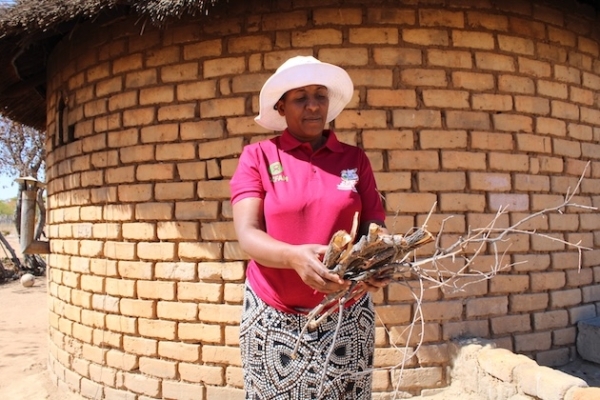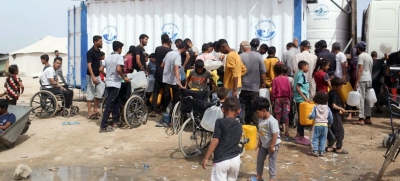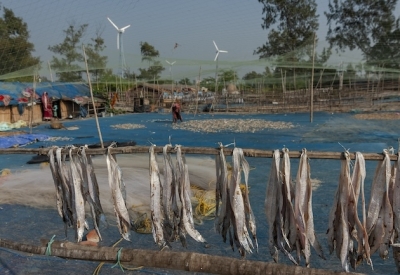KEZI, ZIMBABWE, Dec 20 (IPS) — Having this stove has made life easy for me; I do not worry about getting a lot of firewood to cook outside, and I have more time to do other tasks because cooking is less of a hassle. I no longer have to bend when cooking, which is good for my health; besides, my family now enjoys warm meals anytime, and I get to bake buns that I sell. – Sinikiwe Ngwenya on her energy-efficient stove Five years ago, farmer Sehlisiwe Sisanda would walk into a nearby forested area to fill a scotch cart with huge wood logs for cooking and heating; a pile of firewood would last her a week during the summer.
But now she does not need a cartful of huge logs. Small branches and twigs are enough to last for more than a month.
Since building a wood-efficient stove, twigs and kindle have provided enough energy to cook meals, warm bath water, and bake scones for her family of five.
The tsotso stove is made of bricks in the shape of a box with two holes on top covered with repurposed plough iron wheels, an oven and a smoke chimney fixed to the wall. Tsotso is a local language word for kindle.
The stoves use less wood fuel and emit less pollution than cooking over an open fire. Now Sibanda can cook in her kitchen.
“The stove has been a life saver for me; my family now eats hot meals and has hot bath water every day,” she chuckles, showing the stove in the middle of her rondavel’s kitchen.
“Cooking in the kitchen has become an easy and enjoyable task; the stove is clean and does not produce irritating smoke, and now my family gathers around in the kitchen whenever I am cooking or baking. It has brought us together.”
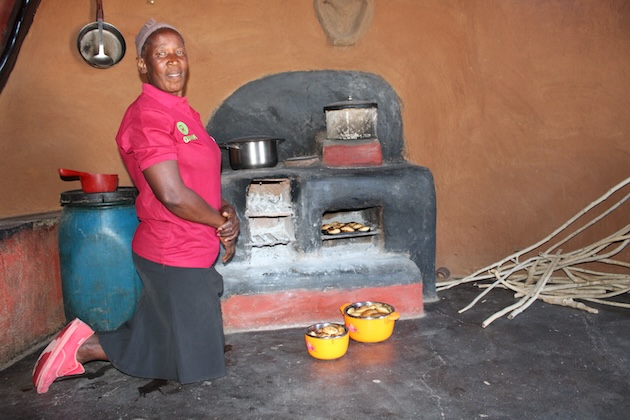
Sibanda bakes buns that she sells at local schools and to neighbours. She uses part of the income from her baking to buy feed for her chickens, which she sells for between USD 5 and USD 6. Selling six chickens earns her enough money to pay a tractor driver to plough her fields.
The stove has helped Sibanda and several women access energy efficiently and reduce deforestation in their village in Kezi, southern Zimbabwe. With many communities not connected to the electricity grid, wood is the key source of energy for cooking and heating. Firewood harvesting is a high price to pay for environmental protection in an arid region that experiences massive deforestation and desertification.
Biomass is a key source of energy for cooking across Zimbabwe. Most women carry the burden of collecting firewood and cooking on open fires, which exposes them to smoke pollution and puts their health at risk. The improved stoves are making a difference because they emit less smoke and use wood more efficiently, saving women the drudgery of collecting huge logs many kilometres from their homes.
Zimbabwe has been losing over 260,000 hectares of forests annually as a result of demand for wood fuel and land clearance for agriculture. This is worrisome given that the country is only planting an average of 34 hectares per year, according to the Zimbabwe Forestry Commission.
Sibanda was trained to build the stoves, and she is a community mobiliser and also trains other women to make them.
Another farmer, Sinikiwe Ngwenya, who had a stove built in her home, says the stove has also changed her life.
“Having this stove has made life easy for me; I do not worry about getting a lot of firewood to cook outside, and I have more time to do other tasks because cooking is less of a hassle,” says Ngwenya. “I no longer have to bend when cooking, which is good for my health; besides, my family now enjoys warm meals anytime, and I get to bake buns that I sell.”
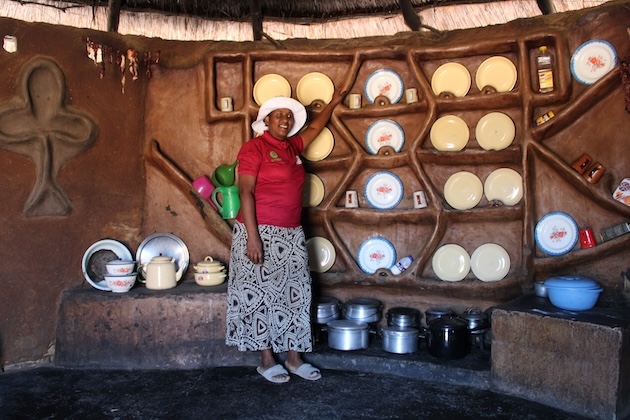
Saving Health, Maybe Trees Too
By getting women to use stoves, a local NGO is not only helping save trees from deforestation but also giving women a hand in easing unpaid care work and also a chance for them to generate income. The women construct the stoves themselves.
Adapting wood-efficient technologies, such as the tsotso stove, is helping women save trees and reduce the burden of unpaid care work.
Women bear the drudgery of collecting firewood, says Lakiness Zimanyiwa, a Programme Officer with the Hope for a Child in Christ (HOCIC), a local NGO that has trained women in rural areas on constructing tsotso stoves under its Securing Rights Programme (SRP PGII) to uplift women economically.
“Tsotso stoves were developed with the aim of reducing the burden of unpaid care work by women as they reduced time taken by women to fetch firewood, and they helped improve income through baking using the stove and selling scones to the community. The stoves are faster, so families have more time to participate in other essential tasks,” Zimanyiwa told IPS.
The stoves have also helped reduce deforestation in Maphisa, as women now take less time gathering firewood and only need to collect twigs, which are enough for cooking a family meal, says Pesistance Mukwena, a project officer with HOCIC.
The world is halfway to the deadline for achieving the Sustainable Development Goals, and Africa is off the mark on several of them, including SDG 7 on access to clean energy, according to the United Nations. A UN Policy Brief on Advancing SDG7 in Africa recommends that policies and financing for clean cooking should be integrated into poverty alleviation and health strategies at the national level.
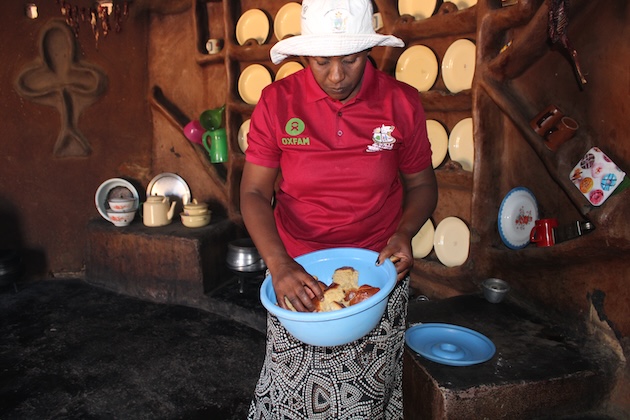
Gender Considerations Crucial to Energy Alternatives
“The gender element is also crucial, as engaging women in clean cooking businesses will boost results and make such endeavours more lasting. Addressing this should range from awareness-raising campaigns to directly engaging women as champions and entrepreneurs,” the UN notes.
Finding alternative and cleaner energy sources is a priority for Zimbabwe, which needs more than USD 55 billion for climate change mitigation activities, mostly in the energy sector. According to the country’s “intended nationally determined contribution” (INDC), Zimbabwe aims to cut carbon emissions by 33 percent by 2030 through clean energy initiatives like boosting hydroelectric power in its energy mix, biogas digesters, and improving energy efficiency.
More than 600 million people in Africa have no access to electricity, and many lack clean cooking energy.
A Vision for Clean Cooking by the International Energy Agency released ahead of the recent COP28 held in Dubai shows that in sub-Saharan Africa, only 20 percent of the population in 29 countries have access to clean cooking, with half of the nearly one billion people without access to clean cooking concentrated in five countries, such as Nigeria, Ethiopia, Tanzania, the Democratic Republic of Congo, and Uganda.
"Financial incentives are a vital policy tool for facilitating the accelerated deployment of clean cooking technologies. In this regard, approximately USD 8 billion of equipment and infrastructure is required annually from now to 2030 to underpin universal access to clean cooking solutions. But this must be complemented by steadfast leadership from policymakers, given that governments are best placed to influence the future," Dr Akinwumi Adesina, President of the African Development Bank Group, says in the report’s foreword.
Indoor air pollution from biomass is one of the top 10 risks for the global burden of diseases, according to the World Health Organization. Household air pollution is responsible for an estimated 3.8 million premature deaths globally.

Climate change has worsened the demand for energy in Africa, where fossil fuels are a top source of energy for cooking, transportation, and heating, says Leleti Maluleke, a researcher for the Human Security and Climate Change programme at Good Governance Africa.
“Unequal energy access disproportionately affects women and girls due to their gender roles and responsibilities at a domestic level," Maluleke tells IPS. “Women, especially in rural and remote areas, use polluting energy for cooking and cutting trees, therefore contributing to emissions and deforestation. The lack of electricity, education, and access to information excludes them from safer and greener ways of performing their domestic duties.”
Maluleke bemoaned the fact that, when it comes to energy discussions, decision-makers frequently overlook the struggles of women and that projects involving energy rarely take gender into account. She adds that energy poverty is an inequality issue. Africa has had a slow uptake of clean energy sources compared to Europe and America, making it necessary to focus on regions and communities that are disproportionately impacted by climate change.
“Africa happens to be one of those regions where more priority needs to be placed, as it contributes the least to emissions but is impacted the most," she said. “Creating awareness of existing inequalities and injustices and how climate change exacerbates them will lead to the necessary dialogues, conversations, and actions that need to be taken on climate justice.”
The use of fossil fuels has taken centre stage on the back of growing climate change impacts, as seen in more and more intense floods, longer droughts, and high temperatures.
However, industrialised countries are not relenting on curbing carbon emissions, despite scientific research indicating that the world has a small window to avoid a catastrophe by phasing out fossil fuels and embracing cleaner renewable energy sources.
Clean Energy is Key to Climate Justice
Alia Kajee, a senior campaigner for public finance and climate justice at 350.org says the climate crisis will disproportionately affect those who are already vulnerable, whether because of poverty, inequality, unemployment, or gender.
“Climate justice would be that those who are most negatively impacted by the climate crisis are able to withstand extreme weather shocks and adapt to changing conditions so that effects of the climate crisis do not hinder and disrupt lives, health and livelihood, or any other human right,” Kajee said, emphasising the need to ensure that evidence-based decisions are made by the governments, ones that align with the science that shows the worsening of the climate crisis and decisions that need to be taken to mitigate the crisis.
“Government must protect society, whether by ensuring safe, reliable, and clean access to energy such as solar or wind power or by ensuring effective and efficient disaster relief,” Kajee said.
The UN Secretary General, Antonio Guterres, called for decisive climate action at COP28, warning that "trading the future for 30 pieces of silver is immoral" and that developed countries must honour their commitments to provide USD 100 billion a year to developing countries for climate support. During COP28, the Green Climate Fund (GCF) received a boost, with six countries pledging new pledges, with total pledges now standing at a record USD 12.8 billion from 31 countries. Eight donor governments announced new commitments to the Least Developed Countries Fund and Special Climate Change Fund totaling more than USD 174 million, while new pledges totaling nearly USD 188 million were made to the Adaptation Fund at COP28.
However, UNCTAD’s World Investment Report 2023 highlights a worrisome increase in the SDG investment gap, surpassing USD 4 trillion annually in developing countries alone, with energy investment needs estimated at USD 2.2 trillion per year.
This feature was made possible with the support of Open Society Foundations.
IPS UN Bureau Report

